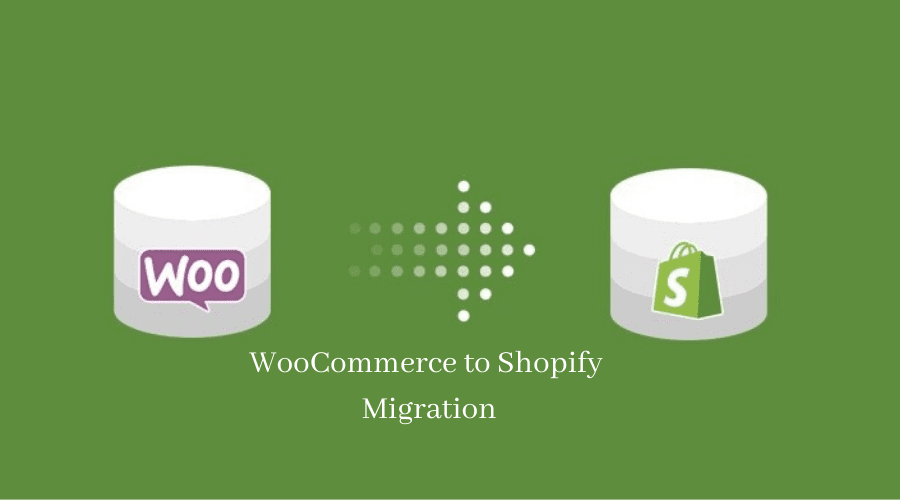WooCommerce to Shopify migration refers to the process of moving an online store from the WooCommerce platform to the Shopify platform. This process involves transferring products, customers, and other data from WooCommerce to Shopify, and can help businesses to take advantage of the many benefits that Shopify has to offer, such as improved scalability, security, user experience, and app ecosystem, as well as better performance and customer support.
The process of migrating from WooCommerce to Shopify can be complex, and it’s important to carefully plan and execute the migration to ensure that the transition is seamless and that no data is lost.
Some common steps in the Shopify migration process include:
-
Export data from WooCommerce:
The first step in the migration process is to export all the data from WooCommerce, including products, customers, and orders.
-
Import data into Shopify:
Once the data has been exported from WooCommerce, it needs to be imported into Shopify. This can be done using the Shopify Import Tool or a third-party migration service.
-
Update product information:
After the data has been imported into Shopify, businesses will need to update product information, such as descriptions, images, and prices, to ensure that they match the information in the original WooCommerce store.
-
Customize Shopify theme:
Next, businesses will need to customize their Shopify theme to match the look and feel of their original WooCommerce store.
-
Test and Launch:
Before launching the new Shopify store, businesses should test the store to ensure that everything is working correctly and that there are no data loss or other issues.
WooCommerce to Shopify migration can provide several benefits to e-commerce businesses, including improved scalability, security, user experience, and app ecosystem, as well as better performance and customer support.
-
Scalability:
Shopify is a fully hosted solution that provides businesses with the resources and tools needed to scale quickly and efficiently. With Shopify, businesses don’t have to worry about server maintenance, software updates, or hardware upgrades, as all of these tasks are handled by Shopify. This allows businesses to focus on what they do best, which is selling their products. Additionally, Shopify provides businesses with a variety of built-in features, such as automatic inventory management, shipping and tax calculations, and multi-currency support, which can help businesses to scale their operations globally.
-
Security:
Shopify is a secure platform that provides businesses with enterprise-level security. Shopify handles all security updates, backups, and PCI compliance, so businesses don’t have to worry about these tasks. Shopify also uses SSL certificates to encrypt data in transit, ensuring that sensitive information, such as credit card numbers, is transmitted securely. Furthermore, Shopify is regularly audited by third-party security experts to ensure that the platform is secure and complies with industry standards.
-
User Experience:
Shopify has a modern and user-friendly interface that can improve the shopping experience for customers. With Shopify, businesses can easily create a professional-looking store with a customizable theme, a customizable checkout process, and a mobile-responsive design. This can lead to increased sales and conversions, as customers are more likely to purchase from a store that looks professional and is easy to navigate. Additionally, Shopify provides businesses with tools to manage customer data, such as the ability to create customer accounts, manage orders, and send automated emails.
-
App Ecosystem:
Shopify has a robust app store that provides businesses with a wide range of extensions and plugins that can add new functionality and features to their store. For example, businesses can add social media integration, shipping rate calculators, and product reviews to their stores. This app ecosystem can help businesses to save time and money by automating tasks, such as managing customer data and shipping orders. Additionally, the app store provides businesses with access to a variety of tools and resources that can help them to grow their store and increase sales.
-
Improved Performance:
Shopify is optimized for performance, resulting in faster page load times, better search engine optimization (SEO), and a better overall user experience. Shopify uses fast and reliable hosting services, which means that stores load quickly and smoothly, even during peak traffic times. Additionally, Shopify provides businesses with tools to optimize their store for search engines, such as customizable meta descriptions and titles, and the ability to add alt tags to images. This can help businesses to increase their visibility in search results and attract more customers.
-
Customer Support:
Shopify offers 24/7 customer support, including live chat, phone support, and email support. This means that businesses can get the help they need, when they need it, to resolve any issues they encounter. Additionally, Shopify provides businesses with a comprehensive knowledge base that includes articles, videos, and tutorials on how to use the platform. This can help businesses quickly find answers to their questions and get the most out of their store.
In conclusion, migrating from WooCommerce to Shopify can provide businesses with a range of benefits, including improved scalability, security, user experience, and app ecosystem, as well as better performance and customer support. By making the switch to Shopify, businesses can streamline their operations, improve their customer experience, and grow their store and sales.

